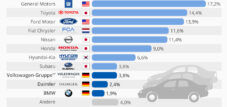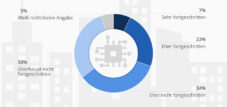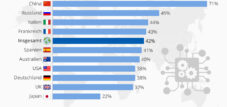Medium-sized businesses 4.0 and digitalization
Language selection 📢
Published on: August 28, 2018 / update from: August 31, 2018 - Author: Konrad Wolfenstein
+++ Mittelstand 4.0 +++ The larger the more digital +++ Digitization of processes in companies +++ Obstacles for companies in digitization +++ Digitization shapes the business of German start-ups +++
Medium-sized businesses 4.0
Digitalization is encompassing more and more economic sectors and has long since arrived in Austrian medium-sized businesses. However, there are clear differences between the individual sectors. The proportion of companies for which digital technologies play a major role in their business model is particularly high in the finance and services sector (74 percent), retail (73 percent) and the transport and traffic sector (72 percent). Keywords such as FinTech or e-commerce should be considered here.
At the other end of the scale, however, are classic industrial sectors such as metal production and processing (35 percent), mechanical engineering (41 percent) and automotive engineering (46 percent). These results show that Industry 4.0 has not yet reached all factory floors - smaller companies in particular are still quite cautious, says Martin Unger, partner at EY Austria.

The bigger, the more digital
How far has the German economy come with digitalization so far? The industry association Bitkom investigated this question in a study reported by Michael Kroker on wiwo.de . Accordingly, 89 percent of the 604 participating companies see digitalization as an opportunity, and 78 percent state that they now have a digital strategy. Nevertheless, over half of the companies see themselves as laggards when it comes to digitalization. The following applies: the smaller the company, the higher the proportion of latecomers. Only in companies with more than 2,000 employees are the pioneers in the majority.
 You can find more infographics at Statista
You can find more infographics at Statista
Digitalization of processes in companies
Digital transformation presents companies with major challenges. In view of changing customer expectations, digital business models must be developed, organizations must be made more agile and processes must be digitized and made more customer-oriented. Sustainable and holistic business process management (BPM) serves as an important basis here.
Many companies see it this way, but according to a study by BearingPoint and BPM&O, only a few digital transformation and BPM initiatives are coordinated. Furthermore, many companies often do not sufficiently focus on customer orientation in their optimization measures.
Selected results of the 2017 Business Process Management Study can be found in the infographic, which was created in collaboration with our customer BearingPoint.

Obstacles for companies in digitalization
Here we show what obstacles companies see when it comes to digitalization.

Digitalization is shaping the business of German start-ups
Anyone who founds a start-up in Germany cannot avoid digitization. According to the “German Startup Monitor 2017” by KPMG , 61.1 percent of German founders state that digitization has a great influence on their business model.
As our infographic shows, Germany is also the most important market for German start-ups with 78.7 percent of sales. The rest of the EU is the second most important market. According to Monitor, for two out of three start-ups, differences in legislation and regulation are the biggest challenge for internationalization.

Digital natives don’t want to go to the provinces
“Medium -sized companies lags behind” or “small and medium -sized companies in digitization”: digitization sleeps: it is often in the newspaper. Commercators often make the company bosses responsible. They lacked knowledge, an understanding of the new possibilities or the will for digitization.
If you ask those responsible in the companies themselves, a completely different problem emerges. Many German medium-sized companies are located away from the hip metropolises. And that's exactly where young, digitally-minded professionals don't want to go, as our infographic based on a new McKinsey survey shows. According to her, more than half of companies have problems recruiting digital specialists. The predominant obstacle is locational disadvantages. However, the managers surveyed also admit that they may not speak the language of the sought-after specialists well enough or that they may not be able to assess the required qualifications well enough.
The study also analyzes the potential for growth and value creation in the consistent digitalization of medium-sized businesses and emphasizes that medium-sized businesses in particular, where quick decision-making processes are often found, have great potential for a rapid change towards digital.






























